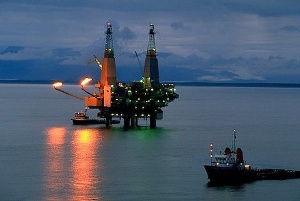About 40 per cent of Ghana’s land has some quantities of oil deposits, Dr. Joe Asamoah, Managing Director of Enerwise Africa said at a workshop.
He said the deposits are located in some parts of Greater Accra, Eastern, Ashanti, Brong- Ahafo, Northern and Volta regions. Speaking on Gas Commercialization as a solution to Ghana’s energy crisis Myth or Reality, at a workshop Dr Asamoah said the oil deposits were off-shore and exploration would be expensive for Ghana.
The workshop was for journalists covering the extractive sector in Ghana held in Accra. He said Ghana was not strong in the gas sector and suggested the use of other alternatives to boost the energy sector.
Dr. Asamoah, who is also an Energy, Oil and Gas Specialist, appealed to the government to provide fiscal incentives to attract investors into the oil and gas sectors to add value to the products.
He called on government to lay the Petroleum Exploration Bill before parliament and also come out with a master gas plan to give the alternative use of gas as well as pricing development rules of gas in Ghana. Dr Asamoah said efforts should be made to provide facilities for the storage of liquefied natural gas while government intensifies the promotion of local demand for gas products to help enhance development.
He expressed unhappiness about the lack of National Development Plan for Ghana and called on civil society organizations and all other stakeholders to compel national leadership to come out with such a blue print to help enhance development.
Dr. Mohammed Amin Adam, Executive Director, Africa Centre for Energy, Oil and Gas, Ghana, a resource person at the workshop, suggested that Ghana uses its indigenous gas to improve the energy sector while it imports gas to develop the petrol chemical industry.
He said the gas reserves were inadequate for the provision of the required electricity needs of Ghana and therefore, Ghana would still have to depend on Nigeria. He said Ghana was not likely to get more gas from Nigeria because Nigeria was getting better prices from new markets.
Dr Adam said Nigeria and Algeria are laying gas pipe line to link to Europe and urged Ghana to consider developing its indigenous gas facilities by providing private power generators guaranteed fuel for investors who come to invest in the energy sector.
Mr. Emmanuel Kuyole, Africa Regional Coordinator of Revenue Watch Institute, urged the media to monitor which sectors the oil money was going to for the citizens to have an informed mind about how the money from the resource was utilised.
The media should track and monitor projects and collect information from the communities about the stages and developments of those projects. They should be more intrusive to know about new oil contract signed and that it was good to look for areas pertaining to royalty rates, tax regimes, beneficiary ownership of the companies, local content and individuals who was part owners in Ghana.
Mr. Kuyole said the media should make it known to the citizenry that it was an offence for Ghanaians front for foreign companies. Mr. Ibrahim Tanko, Programme Manager Star-Ghana, said many of the challenges facing the people was the lack of knowledge but not data and therefore the media should provide opportunities for all to express and disseminate information.
Media should not limit that right by giving the few to talk on behalf of all. Let all, every individual to have access to express their opinion for the authorities to hear their voices, Mr. Tanko said. He said there has been too much focus on the presidency and parliament to the detriment of giving more attention to the citizenry and institutions to be responsive and functional.
Mr Tanko appealed to media to create safe space for the citizens, adding: The space is becoming dangerous than before as people now fear to express their opinion. People are refusing to take up public positions for fear of being tagged with a political party.
Click to view details



Business News of Saturday, 5 April 2014
Source: GNA
Six regions identified with potential oil deposit
Entertainment
















